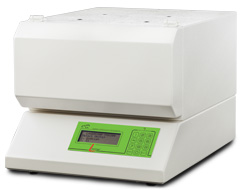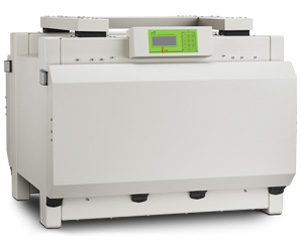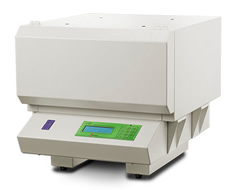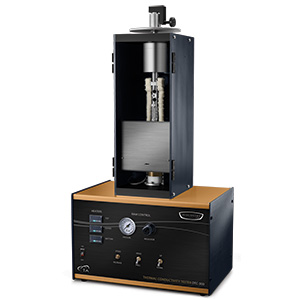View Thermal Conductivity Brochure Request a Quote
Thermal conductivity defines a material’s ability to transfer heat. Accurate values are essential for modeling and managing heat, whether the component of interest is called on to insulate, conduct, or simply withstand temperature changes. Information about these properties are routinely used in heat transfer models of all complexities. Thermophysical property measurements also reflect important information about material composition, purity and structure, as well as secondary performance characteristics such as tolerance to thermal shock. Steady-state methods determine thermal conductivity directly from the relationship between heat flow through the tested material and a temperature difference applied across the material (Fourier Law). A specimen of approximately 2” in diameter is positioned between two temperature-controlled plates with a user-defined temperature difference and the average heat flux through the material is measured to calculated thermal conductivity and thermal resistance at each setpoint.
The DTC 300 and the FOX 50 Series of Heat Flow Meters provide the solution to a highly diverse set of testing needs for the direct measurement of thermal conductivity of low to medium conductivity materials between -20°C and 300°C. The DTC 300 is a guarded heat flow meter measuring the thermal conductivity over a wide range of temperatures accordingly to the ASTM E1530 Standard. It employs one calorimeter module, located in the bottom stack, for the measurement of thermal conductivity, and a side guard furnace to prevent edge heat loss. A pneumatic load is applied to the sample and test stack, in combination with thermally conductive interface compound, to minimize contact resistance at the sample surfaces. The FOX 50 conforms to the ASTM C518 Standard and is configured with high performance, proprietary thin film heat flux transducers, digital thickness measurements, and responsive temperature control with integrated contact-resistance correction.
TA Instruments steady-state heat flow meters allow for the direct measurement of thermal conductivity of materials that span from insulation building materials to polymers, composites, ceramics and refractories according to a large number of ASTM, ISO and EN standard methods. The FOX 50 Heat Flow Meter is an accurate, easy-to-use instrument for measuring thermal conductivity in the range of 0.1W/mK to 10W/mK and provides rapid results in a compact footprint. The exceptionally versatile DTC 300 covers an extremely wide conductivity range of 0.1 to 40 W/mK using three user-interchangeable stack modules. Due to its flexibility and expanded analytical range, the DTC 300 is ideally suited for research laboratories exploring the thermal conductivity of solids, liquids, pastes, and even polymers through the melt.
Thermal Conductivity Meters
Application Notes
- Block Co-Polymers TPR Characterization by Oscillatory Rheology
- Rubber Testing with DMA Instruments
- TPV Flow Properties Determination by Dynamic (Oscillatory) Rheology
- Characterizing Mixing Stability Differences in Butadiene Rubbers
- Troubleshooting Extrusion Instabilities with a Rubber Process Analyzer (RPA)
- Using the Large Amplitude Oscillatory Shear (LAOS) Method to Characterize Polymer Long Chain Branching
- Using the TA Instruments Rubber Process Analyzer (RPA) to Optimize Mastication






